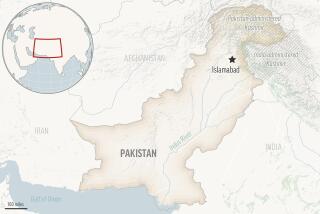Pakistan blast targets politician; 20 die
- Share via
KARACHI, PAKISTAN — A suicide bomber set off his explosives Monday while trying to force his way into an opposition politician’s home in eastern Pakistan, killing at least 20 people and injuring more than 60 others during a holiday celebration.
The targeted lawmaker, Rashid Akbar Khan Nawani, who is a member of Pakistan’s minority Shiite Muslim community, was injured but survived, police said. Hundreds of people were attending a party inside the compound to mark the end of the Islamic festival of Eid al-Fitr.
Nawani is affiliated with the party of former Prime Minister Nawaz Sharif, which quit the coalition government in August in a dispute over the reinstatement of judges fired last year by former President Pervez Musharraf.
The suicide bombing, in the town of Bhakkar, was the third attack in a week aimed at a prominent Pakistani politician.
Last week, Asfandyar Wali Khan, leader of a secular party that competes with Islamic militants for support among ethnic Pashtuns, escaped injury in a suicide bombing at a gathering in his family compound in Pakistan’s troubled northwest. On Sunday, suspected insurgents fired rockets at the home of a senior official in Pakistan’s North-West Frontier Province, where much of the recent violence has been centered.
It was unclear whether the attack against Nawani was motivated by sectarianism. Some militant groups regard the country’s Shiite minority as a threat. A majority of Pakistanis are Sunni Muslims.
Pakistan has been suffering a plethora of suicide attacks, which have killed about 1,200 people in the last year. Many here believe the stepped-up campaign of attacks has to do with the government’s military moves against Islamic insurgents in the tribal areas bordering Afghanistan.
Pakistani lawmakers this week are to receive a closed-door briefing from senior policymakers and military officials about the government’s strategy for confronting militants.
American officials have expressed frustration over what they describe as Pakistan’s failure to hunt down key Taliban and Al Qaeda figures believed to be sheltering in the tribal areas. Over the last two months U.S. forces in Afghanistan have intensified airstrikes in the border zone, mainly carried out by unmanned Predator drones.
Pakistan’s president of one month, Asif Ali Zardari, triggered an uproar when he suggested in an interview published in the Wall Street Journal over the weekend that his country had tacitly agreed to allow American strikes on its soil.
“We have an understanding, in the sense that we’re going after an enemy together,” the newspaper quoted Zardari as saying.
Zardari took over his party’s leadership after the assassination in December of his wife, Benazir Bhutto.
American strikes in Pakistan are extremely unpopular with the public, and most politicians speak very guardedly on the subject.
Zardari aides said Monday that his remarks had been misconstrued.
--
Special correspondent Mubashir Zaidi in Islamabad, Pakistan, contributed to this report.
More to Read
Sign up for Essential California
The most important California stories and recommendations in your inbox every morning.
You may occasionally receive promotional content from the Los Angeles Times.










